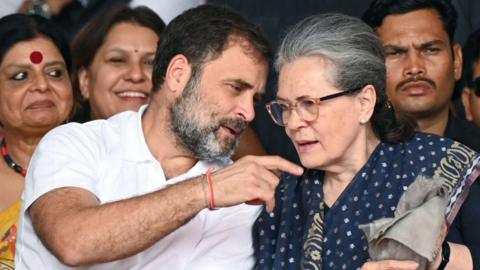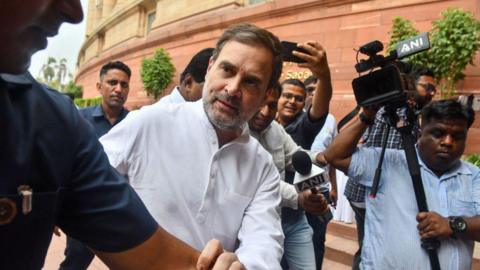India’s Vote Theft Scandal: The Ultimate Political Meltdown Exposed
Hello everyone. Let’s take a trip to the world’s largest democracy, where the stakes are higher than a hardcore permadeath run in Dark Souls, and the politics are just as punishing, except the mobs wear suits and shout about constitutional integrity while metaphorically stabbing each other in the back. Welcome to India’s latest political pugilism – the ‘vote theft’ controversy that’s got the entire establishment throwing chairs and popcorn at each other like a broken WWE storyline.
Rahul Gandhi’s Allegations: The Political Boss Fight
Rahul Gandhi, perennial opposition poster boy and leader of the Congress party, has entered the arena swinging. He claims – with all the conviction of a player convinced the RNG is rigged – that the 2024 parliamentary elections were riddled with manipulated votes, duplicate entries, and more dodgy addresses than a shady MMO gold-farming website. He even flagged one instance of 80 voters registered at a single address in Mahadevapura, Bangalore, which sounds less like a neighborhood and more like a zombie spawn point.
His most dramatic example? A voter allegedly casting ballots twice. The ECI promptly denied this as if they’d been accused of cheating at poker – insulted, outraged, but not actually showing the cards. Gandhi insists that irregularities cost him and his alliance at least 48 seats, and wants those juicy digital voter rolls released so anyone with an internet connection and a conspiracy theory YouTube channel can dig in.

The Election Commission & BJP Clap Back
The Election Commission’s response? Classic boss-phase transition. They called Gandhi’s claims “absurd,” demanded he either swear an oath or issue a full public apology. In other words: put up or shut up. Turns out, according to their Karnataka unit, the Congress never formally objected during the voter roll revision before the elections. Which is basically like letting someone loot your base in Ark for a month and then filing a complaint once your T-rex is gone.
BJP leaders waded in with the subtlety of a Molotov cocktail at a peace rally. Accusations of “anarchy,” “defaming democracy,” and “tearing up constitutional dignity” were hurled about like bad loot drops, with the clear intent of making Gandhi and his crew look like a misfit raid party unable to handle mechanics.
Bihar’s Revision Drive: Side Quest or Main Storyline?
Adding fuel to the fire, there’s the ongoing Special Intensive Revision (SIR) in Bihar, a state with upcoming elections. Officials have been knocking on doors to verify all 78.9 million voters, a task that makes grinding for 100% map completion seem like a weekend stroll. The ECI says this is to purge dead voters and duplicates, but critics argue it’s disenfranchising migrants and minorities like a badly programmed anti-cheat that bans actual players while the bots run free.
And then comes the wonderfully absurd discovery of a voter aged 124 years in the draft list. Either Bihar has unlocked immortality tech and kept it secret, or someone forgot to delete Grandma’s name for the past 50 years. Gandhi pounced on this like a gamer spotting a glaring exploit, declaring that more examples like this are out there and ominously warning, “The story is not over yet.”
The Political Meta
At its heart, this isn’t just about whether some guy voted twice or a century-old ghost is still in the register. It’s about trust – a resource more finite in politics than health potions in a boss rush. India’s Supreme Court has basically said, “It’s probably just trust issues, lads, but if we spot mass voter exclusion, we’ll step in.” That’s not exactly an ironclad guarantee; it’s more like your game dev saying, “We’ll patch it if it’s actually broken,” while their servers lag into oblivion.
Diagnosis from the Doctor’s Desk
As an armchair political medic, I can tell you: this patient has a chronic case of Electoral Trust Deficit Disorder, aggravated by bipartisan inflammation and untreated transparency deficiency. Left unchecked, the symptoms will persist – mutual accusations, procedural stalemates, and public cynicism. The recommended treatment? A high-dose injection of verifiable data, publicly available audits, and fewer politicians acting like PvP griefers in a co-op game.
Final Verdict
This saga is like watching a broken esports match where both teams accuse the other of hacking, while the referees insist the rules are fine. There’s spectacle, outrage, and just enough legitimate concern to keep you hooked. But as with any good conspiracy subplot, the truth is buried under layers of partisan noise. It may not be the end of the story, but right now, the whole thing plays like a soap opera with electoral spreadsheets.
Overall impression? Bad. Not just bad in execution, but bad for faith in the system. This isn’t the immersive, balanced political gameplay that a billion players signed up for – it’s the kind of exploit-laden server that makes you want to log off until the next patch drops.
And that, ladies and gentlemen, is entirely my opinion.
Article Source: The row over ‘vote theft’ that has shaken Indian politics, https://www.bbc.com/news/articles/c0l6kg80de5o



